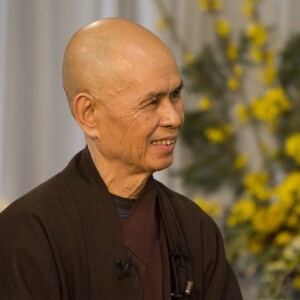
November 10, 2013. 94-minute dharma talk given by Thich Nhat Hanh from Stillwater Meditation Hall, Upper Hamlet of Plum Village. The sangha is preparing for the upcoming 90-day winter retreat. We begin with two chants from the monastics followed by a powerful teaching on technology with very specific instructions to those participating in the 90-day retreat. Both the audio and video are linked below.
It is five days before the winter retreat begins at Plum Village. The great ordination ceremony this coming year will take place beginning May 23, 2014 and the 21-Day retreat, starting on June 1, 2014, will have the theme What happens when you die?
For the monastics, during the winter retreat we will stay within the boundaries of Plum Village and this includes not going out on the Internet. There will be no individual email communication and all emails can be sent to one address only and be delivered to you. There is no need to check email. There is absolutely no Facebook too. Facebook is neither good nor evil but we will not use it during the winter retreat.
Making good use of technology. Thay relayed the story of visiting Google this last month and some of the questions they wanted to hear answers. How can we innovate in order to take good care of ourselves? What is the interplay between intention, insight and innovation? How can technology be a force for integration rather than destruction?
How can we detach from our work? Thay shares about what he heard and observed at Google. What is the emotional health of Googlers? They want to use technology to solve what appears to be a technological disease. Technology is taking away our time. We need to look for the path to transform our ill being.
Image Source: socialunderground.com
We begin with intention, by asking, what do we want? If technology can help us create happy and joyful feelings then we can make good use of technology. Can we reduce the amount of stress within ourselves?
Thay offers ideas for corporate and technology leaders. Good methods to use and apply technology. As part of the teaching, we look at two specific Mental Formations - contact and volition.
Four aspects of monastic life include learning to study, learning to practice, working, and playing. And yet these all interare.
For the practitioner, if we are doing it exactly like the people in the world then we may not be able to help the people in the world. No email and no Internet and no Facebook can be attractive and to allow us to become a real practitioner. It can be an awakening.
https://youtu.be/a9GG4JtX8t4
view more
More Episodes
Live Happily in the Present Moment
 2021-02-07
2021-02-07
 2021-02-07
2021-02-07
How do we Practice as a Sangha
 2021-01-21
2021-01-21
 2021-01-21
2021-01-21
Making Peace with Ourselves
 2020-07-06
2020-07-06
 2020-07-06
2020-07-06
Happiness is Right Here
 2020-04-17
2020-04-17
 2020-04-17
2020-04-17
Falling in Love with a Cloud
 2020-04-15
2020-04-15
 2020-04-15
2020-04-15
The Raft is not the Shore
 2020-04-13
2020-04-13
 2020-04-13
2020-04-13
The Wisdom of Nondiscrimination
 2020-04-12
2020-04-12
 2020-04-12
2020-04-12
Misunderstanding and Fear
 2020-03-16
2020-03-16
 2020-03-16
2020-03-16
Sexual Abuse at the Family Level
 2020-03-15
2020-03-15
 2020-03-15
2020-03-15
Working with Judgment and Fear
 2020-03-12
2020-03-12
 2020-03-12
2020-03-12
Chronic Depression and Medications
 2020-03-08
2020-03-08
 2020-03-08
2020-03-08
Living with Cancer
 2020-03-07
2020-03-07
 2020-03-07
2020-03-07
Sexual Misconduct
 2020-03-05
2020-03-05
 2020-03-05
2020-03-05
Toxic Inputs
 2020-02-16
2020-02-16
 2020-02-16
2020-02-16
Aware of Suffering Surrounding Death
 2020-02-14
2020-02-14
 2020-02-14
2020-02-14
Living with all the Madness
 2020-02-09
2020-02-09
 2020-02-09
2020-02-09
I Have a Big Family
 2020-02-03
2020-02-03
 2020-02-03
2020-02-03
How Can I Control my Temper?
 2020-02-02
2020-02-02
 2020-02-02
2020-02-02
Sitting on our Portable Lotus Flower
 2019-12-31
2019-12-31
 2019-12-31
2019-12-31
Breathing Begins Transformation
 2019-12-24
2019-12-24
 2019-12-24
2019-12-24
012345678910111213141516171819
Create your
podcast in
minutes
- Full-featured podcast site
- Unlimited storage and bandwidth
- Comprehensive podcast stats
- Distribute to Apple Podcasts, Spotify, and more
- Make money with your podcast
It is Free
- Privacy Policy
- Cookie Policy
- Terms of Use
- Consent Preferences
- Copyright © 2015-2024 Podbean.com



